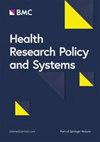Building Health Policy and Systems Research (HPSR) capacity in India: Reflections from the India HPSR fellowship program (2020–2023)
IF 3.6
2区 医学
Q1 HEALTH POLICY & SERVICES
引用次数: 0
Abstract
Building capacity for Health Policy and Systems Research (HPSR) is critical for advancing the field in lower- and middle-income countries (LMICs). The India HPSR fellowship program is a home-grown capacity-building initiative, anchored at the Health Systems Transformation Platform (HSTP), New Delhi, and developed in collaboration with a network of institutes in India and abroad. In this practice-oriented commentary, we provide an overview of the fellowship program and critically reflect upon the learnings from working with three cohorts of fellows between 2020 and 2023. This commentary draws on routine program documentation (guidelines, faculty meeting reports, minutes of meetings of curricula and course development) as well as the perspectives of faculty and program managers associated with the fellowship. We have had several important learnings in the initial years of program implementation. One, it is important to iteratively modify globally available curricula and pedagogies on HPSR to suit country-specific requirements and include a strong component of ‘unlearning’ in such fellowships. Secondly, the goals of such fellowship programs need to be designed with country-specific contextual realities in mind. For instance, should publication of fellows’ work be an intended goal, then contextual deterrents to publication such as article processing fees, language barriers and work-related obligations of faculty and participants need to be addressed. Furthermore, to improve the policy translation of fellows’ work, such programs need to make broader efforts to strengthen research–policy–practice interfaces. Lastly, fellowship programs are cost-intensive, and outputs from them, such as papers or policy translation, are less immediate and less visible to donors. In the absence of these outputs, consistent funding can be a roadblock to sustaining these fellowships in LMICs. The experience of our fellowship program suggests that LMIC-led capacity-building initiatives on HPSR have the potential to influence changes in health systems and build the capacity of researchers to generate evidence for policy-making. The sharing of resources and teaching material through the fellowship can enable learning for all institutions involved. Furthermore, such initiatives can serve as a launchpad for the creation of regional and international HPSR communities of practice, with a focus on LMICs, thereby challenging epistemic injustice in teaching and learning HPSR.印度卫生政策与系统研究(HPSR)能力建设:印度卫生政策与系统研究奖学金计划(2020-2023 年)的思考
卫生政策与系统研究(HPSR)的能力建设对于推动中低收入国家(LMICs)在这一领域的发展至关重要。印度卫生政策与系统研究奖学金计划是一项本土能力建设计划,以新德里卫生系统转型平台(HSTP)为基地,并与印度国内外的研究机构网络合作开发。在这篇以实践为导向的评论中,我们概述了该研究金项目,并批判性地反思了 2020 年至 2023 年期间与三批研究员合作的学习成果。本评论参考了常规项目文件(指南、教师会议报告、课程和课程开发会议记录)以及与研究金相关的教师和项目管理人员的观点。在计划实施的最初几年,我们有几个重要的体会。其一,必须反复修改全球现有的关于 HPSR 的课程和教学法,以适应各国的具体要求,并在此类研究金中纳入大量 "不学习 "的内容。其次,在设计此类研究金计划的目标时需要考虑到各国的具体国情。例如,如果将发表研究人员的工作成果作为预期目标,那么就需要解决文章处理费、语言障碍以及教职员工和参与者与工作相关的义务等阻碍发表的因素。此外,为了更好地将研究员的工作成果转化为政策,此类计划需要做出更广泛的努力,加强研究-政策-实践之间的联系。最后,研究金项目是成本密集型项目,其产出,如论文或政策转化,对捐助者来说不那么直接,也不那么明显。在缺乏这些成果的情况下,持续的资金投入可能会成为低收入国家维持这些研究金项目的障碍。我们研究金计划的经验表明,由低收入国家主导的卫生和公共卫生研究能力建设计划有可能影响卫生系统的变革,并提高研究人员为决策提供证据的能力。通过研究金共享资源和教材,可以使所有参与机构都能学到东西。此外,此类倡议还可以作为创建地区和国际卫生和公共卫生研究实践社区的启动平台,重点关注低收入和中等收入国家,从而挑战卫生和公共卫生研究教学和学习中的认识论不公正。
本文章由计算机程序翻译,如有差异,请以英文原文为准。
求助全文
约1分钟内获得全文
求助全文
来源期刊

Health Research Policy and Systems
HEALTH POLICY & SERVICES-
CiteScore
7.50
自引率
7.50%
发文量
124
审稿时长
27 weeks
期刊介绍:
Health Research Policy and Systems is an Open Access, peer-reviewed, online journal that aims to provide a platform for the global research community to share their views, findings, insights and successes. Health Research Policy and Systems considers manuscripts that investigate the role of evidence-based health policy and health research systems in ensuring the efficient utilization and application of knowledge to improve health and health equity, especially in developing countries. Research is the foundation for improvements in public health. The problem is that people involved in different areas of research, together with managers and administrators in charge of research entities, do not communicate sufficiently with each other.
 求助内容:
求助内容: 应助结果提醒方式:
应助结果提醒方式:


